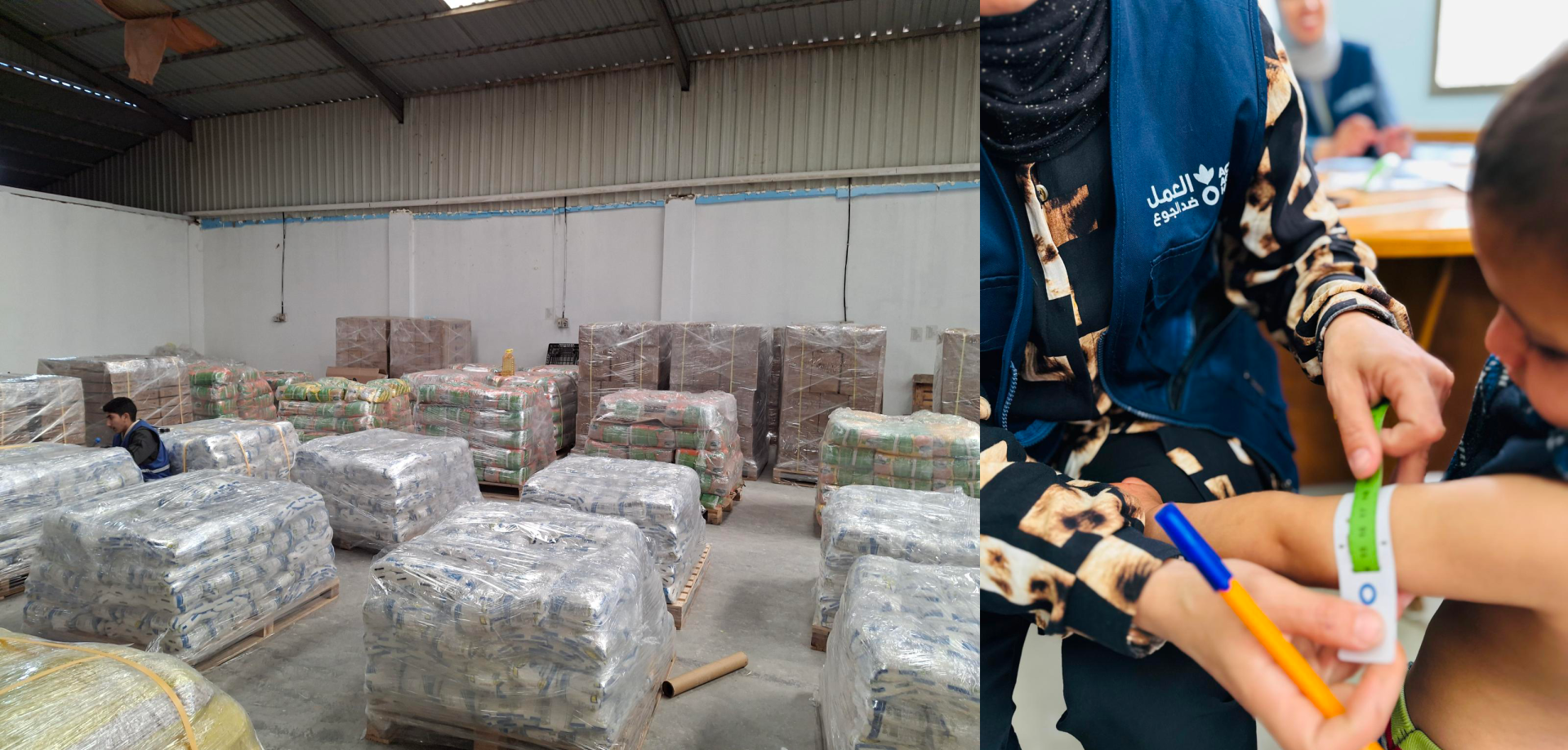

Action Against Hunger warns that 80% of families in Gaza are on the verge of running out of food
2 MONTHS WITHOUT ENTRY OF HUMANITARIAN AID: FOOD IS RUNNING OUT IN GAZA
- Action Against Hunger has just three weeks of food supplies in the north, and two weeks in the south.
- The organizations is one of World Food Programme’s (WFP) only partners with food supplies left for community kitchens in northern Gaza.
- 171,000 metric tons of food from humanitarian organizations are stuck outside of Gaza, ready to be distributed into the Strip once access is granted. This is the equivalent to food rations for three to four months for the whole population, 2.1 million people.
- "We have been forced to prioritize among the most vulnerable," says an organization worker from Gaza. "This is a very difficult measure, as it means that some families may not receive the help they need, despite the emergency circumstances."
Madrid/Jerusalem. April 30, 2025. This May 2 marks two months since the blockade of humanitarian aid entering Gaza. The United Nations confirmed that The World Food Program (WFP) no longer has food stocks in the region. Action Against Hunger, one of WFP's only partners with food supplies in northern Gaza, has three weeks of food supplies in the north and two in the south for community kitchens. Humanitarian organizations have more than 171,000 metric tons of food stocks (equivalent to food rations for the whole population, 2.1 million people, for three to four months) outside Gaza in the region, ready to be transported into the Strip if access is granted.
“Humanitarian aid remains the primary food source for 80% of households across all governorates while food production and food systems in Gaza have been severely weakened,” explains Natalia Anguera, head of operations in the Middle East for Action Against Hunger. “That means that, if the entry of humanitarian aid continues to be blocked, 8 out of 10 families in Gaza won’t be able to access food.” Adds: “The lack of food, clean water and medicine is causing child malnutrition to increase, leading to stunting, and they need sufficient quality and quantity of nutrients to survive.”
Action Against Hunger and other organizations are identifying that families are increasingly adopting coping strategies to stretch any remaining meagre supplies from past aid distributions; for example, mixing crushed macaroni with flour, reducing size and frequency of meals, limiting bread consumption to children or one piece per family member per day.
“We have been forced to prioritize and distribute aid based on the degree of need,” says an Action Against Hunger worker in Gaza whose identity has to remain anonymous. “This is a very difficult measure, as it means that some families may not receive the aid they need, despite the circumstances of emergency. At times, the number of people we serve in our nutrition programs has exceeded the number of nutritional supplements available for their children's needs.” Adds: “In addition, repeated displacement orders have caused instability and tensions, hampering our access to targeted areas and impacting the timely delivery of aid.”
The crisis in Gaza has reached a new level of unprecedented. No entry of food, clean water, and medicine for over 60 days has yet again pushed the Palestinian population to extreme levels of vulnerability. Action Against Hunger has been working tirelessly to provide vital assistance, but resources hinge upon the reopening of all border crossings. and the needs of a population of 2.1 million are immense.
How we work in this context
Natalia Anguera says: “Hunger and impediments to humanitarian worker must never be used as bargaining chips. The obstruction of aid workers' movements and continued displacement orders create serious impediments to evaluate the full scale and scope of crisis in Gaza, which creates a lot of uncertainty especially regarding the situation for the most vulnerable. Parties to the conflict and the international community must not wait to act until famine is declared. By that time, we will have collectively failed to save preventable deaths.”
“We are doing our best to continue providing vital services,” says the Action Against Hunger worker in Gaza. “The nutrition team continues to make significant efforts, especially for pregnant and lactating women, and to provide them with practical guidance so that they can take care of their health and that of their children in these harsh conditions.” He adds, “But the situation is becoming more complex by the day. We sincerely hope for an urgent response that will support our efforts and enable us to meet the growing needs, especially among the most vulnerable groups.”
At this critical time, Action Against Hunger reaffirms its commitment to continue supporting the people of Gaza and calls on governments and international organizations to act decisively to alleviate the suffering of millions of people. Action Against Hunger insists that without an opening of all border crossings and the lifting of the siege, the crisis could reach levels unforeseen across the last two years. The organization calls for the immediate entry and distribution of humanitarian aid governed by humanitarian principles, the release of all hostages and a permanent ceasefire. It is essential that the needs of Gaza’s 2.1 million people are prioritized, and obligations required by international humanitarian law are met.
